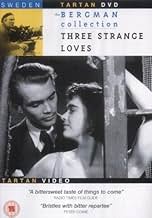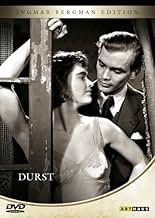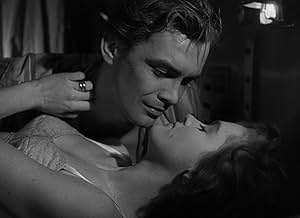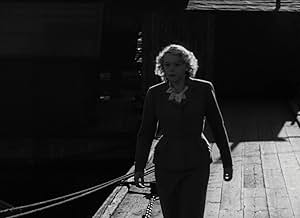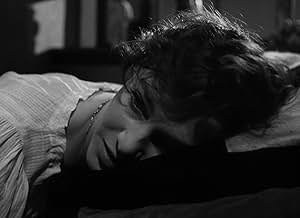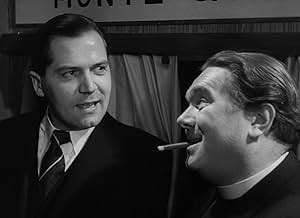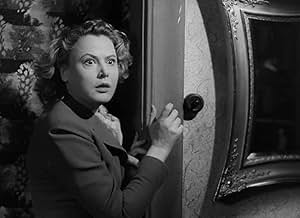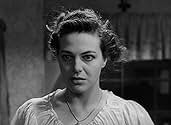Una pareja dependiente que pasa por una crisis matrimonial regresa a Estocolmo después de un viaje a Italia. Paralelamente, una viuda se resiste a las seducciones de otras dos personas: su p... Leer todoUna pareja dependiente que pasa por una crisis matrimonial regresa a Estocolmo después de un viaje a Italia. Paralelamente, una viuda se resiste a las seducciones de otras dos personas: su psiquiatra y una amiga lesbiana.Una pareja dependiente que pasa por una crisis matrimonial regresa a Estocolmo después de un viaje a Italia. Paralelamente, una viuda se resiste a las seducciones de otras dos personas: su psiquiatra y una amiga lesbiana.
- Dirección
- Guionistas
- Elenco
Mimi Nelson
- Valborg - Ruts kamrat i balettskolan
- (as Mimmi Nelson)
Wiktor Andersson
- Doorkeeper
- (sin créditos)
Verner Arpe
- Tysk biljettsamlare
- (sin créditos)
Ingmar Bergman
- Tågpassagerare
- (sin créditos)
Britta Brunius
- Sjuksköterskan efter Ruts abort
- (sin créditos)
Calle Flygare
- Den danske prästen på tåget
- (sin créditos)
Inga Gill
- Lady at Hotel
- (sin créditos)
Herman Greid
- Stadsbudet i Basel
- (sin créditos)
Helge Hagerman
- Den svenske prästen på tåget
- (sin créditos)
- Dirección
- Guionistas
- Todo el elenco y el equipo
- Producción, taquilla y más en IMDbPro
Opiniones destacadas
True, the movie has got a few flaws, mostly in the construction; the structure lacks necessity and the flashbacks appear a bit randomly, it seems. However, the essential Bergman is already present (it's 1949): a few absolutely superb close-ups on the main characters' faces, the way people suddenly appear on camera, from unexpected angles, etc. And Bergman is already displaying some of the themes he will use constantly : the train travel, war and ruins as a background for difficult relationships, plus of course the impossibility and at the same time the inevitability of the relationship between man and woman : it's doomed, but there's no other way... In fact, the French title is "La fontaine d'Aréthuse", which points to this very idea. Precisely, I'd like to discuss another point : the original title is "Thirst". And in fact, people in the movie drink a lot : wine, beer, milk, or fail to drink : in a dramatic moment, one character refuses to drink coffee, tea is prepared, but doesn't taste good. I believe people never drink water, but water (the sea) is the backdrop for the happiest moment of the movie and the most desperate (with the suggestion of a suicide). For Bergman, I believe, Man is essentially thirsty, is desperately thirsty for something to calm and comfort him. But the world is hostile, relationships can offer only brief moments of satisfaction on a backdrop of tension and pain. Other comments on this title ? Very interesting movie overall.
The early Bergman films are interesting in how they portray an artist evolving with increased experience. They're not always successful artistic endeavors overall, but they show how a studio system can foster and hone talent through experience.
Thirst tells the story of a young married couple on their way back from a vacation in Italy. We see them in France as they are about to board a train through 1946 Germany back towards Sweden. The woman is haunted by a previous affair and a subsequent abortion all while she nurses a bad knee in the hopes that one day she will dance ballet again. The husband is a penny pinching academic obsessed with coins and who had had an affair with another woman out of, what he calls, pity for her status as a widow. None of this is a secret, all of the sins are out in the open.
The two have the kind of talks typical in Bergman films (in particular his later, post-existential films like Scenes from a Marriage) and come to the conclusion that they should reconcile their differences and try to work through their problems to a happy marriage in the film's final moments.
The problem with the movie is its structure. This could be a case study in a poorly structured story pretty much killing a film. The first twenty minutes are dedicated to flashbacks to the wife's affair with a lieutenant in the Swedish military before we ever meet the husband. The husband's lover is first mentioned about thirty minutes into the movie, and she is introduced a few minutes later in a scene with her cruel psychologist. She then disappears for a half hour. There's also the wife's old dancing friend who appears in another flashback and then shows up with the husband's former lover, trying to seduce her which ends up leading to the lover's suicide.
The problem isn't the events themselves, but the fact that they are bunched together without any real effort to weave it in and out of the other threads. As typical, I read the essay in the Criterion Collection's large book and was unsurprised to discover that the script (which Bergman didn't write) was based on a series of short stories. Considering my issues with the film's structure, it made perfect sense. It felt very staccato with one story going through its beginning, middle, and end before another one took over. It's not quite that, but, especially considering the initial twenty minutes with the wife's lover, it feels very apropos.
I do think that if the movie had been re-arranged it would have worked better. I don't think it's something that purely an editing job would have done. At least some of it would have needed to originate at the script. The husband's lover needed at least one more scene to flesh her out for instance (her first scene with the psychologist is highly emotionally delivered and feels out of place because we had never met her before).
Stylistically, the movie feels very Bergman. The topics he loved are there (the marriage, even the dancer is a performer that he frequently featured). His visual style sometimes feel a little more active than normal, but we clearly see his visual tics such as two people in frame talking to each other, letting actors demonstrate who they are through long exposures to their smaller actions, and strong performances throughout. I just wish the story had been arranged in a way that made sense.
Thirst tells the story of a young married couple on their way back from a vacation in Italy. We see them in France as they are about to board a train through 1946 Germany back towards Sweden. The woman is haunted by a previous affair and a subsequent abortion all while she nurses a bad knee in the hopes that one day she will dance ballet again. The husband is a penny pinching academic obsessed with coins and who had had an affair with another woman out of, what he calls, pity for her status as a widow. None of this is a secret, all of the sins are out in the open.
The two have the kind of talks typical in Bergman films (in particular his later, post-existential films like Scenes from a Marriage) and come to the conclusion that they should reconcile their differences and try to work through their problems to a happy marriage in the film's final moments.
The problem with the movie is its structure. This could be a case study in a poorly structured story pretty much killing a film. The first twenty minutes are dedicated to flashbacks to the wife's affair with a lieutenant in the Swedish military before we ever meet the husband. The husband's lover is first mentioned about thirty minutes into the movie, and she is introduced a few minutes later in a scene with her cruel psychologist. She then disappears for a half hour. There's also the wife's old dancing friend who appears in another flashback and then shows up with the husband's former lover, trying to seduce her which ends up leading to the lover's suicide.
The problem isn't the events themselves, but the fact that they are bunched together without any real effort to weave it in and out of the other threads. As typical, I read the essay in the Criterion Collection's large book and was unsurprised to discover that the script (which Bergman didn't write) was based on a series of short stories. Considering my issues with the film's structure, it made perfect sense. It felt very staccato with one story going through its beginning, middle, and end before another one took over. It's not quite that, but, especially considering the initial twenty minutes with the wife's lover, it feels very apropos.
I do think that if the movie had been re-arranged it would have worked better. I don't think it's something that purely an editing job would have done. At least some of it would have needed to originate at the script. The husband's lover needed at least one more scene to flesh her out for instance (her first scene with the psychologist is highly emotionally delivered and feels out of place because we had never met her before).
Stylistically, the movie feels very Bergman. The topics he loved are there (the marriage, even the dancer is a performer that he frequently featured). His visual style sometimes feel a little more active than normal, but we clearly see his visual tics such as two people in frame talking to each other, letting actors demonstrate who they are through long exposures to their smaller actions, and strong performances throughout. I just wish the story had been arranged in a way that made sense.
Ingmar Bergman very quickly became one of my favourite directors. Have only been familiar with him since 2012 which was around the period when my film and television taste started to broaden, but it was easy to be intrigued by his distinctive directing style so it was easy to get into his work. Not all his films are great and he was not immune from misfires, but many of them are very, very good and even masterpieces, it is not hard to see why he became such a big influence in cinema.
None of Bergman's late-40s films, when he was still learning his craft and finding his style, are among his best work. It was around the early-mid-50s when he began to come into his own. His early films are still interesting though and there are not really any duds. The most commercially successful of Bergman's early films, 'Three Strange Loves' as called in my country is certainly very intriguing and it is well done in a lot of areas. The story is very flawed and something of a big caveat but 'Three Strange Loves' is fine from a directing standpoint and has a lot to recommend.
'Three Strange Loves' story could have been executed better. The structure is very jumpy, with some constant backing and forthing that was sometimes hard to follow. The flashbacks intrigue mostly but occasionally drag and some could have been placed better and not as randomly introduced or as fragmented.
Do agree as well that the supporting characters' subplots are not as involving as that of the central couple. Some are also not as necessary or as cohesive as others and feel like padding.
On the other hand, 'Three Strange Loves' is well made visually, with the photography being both stylish and atmospheric. Bergman's directing was becoming more refined all the time and there are enough glimmers of brilliance, one can see his distinctive style coming through in some of the more symbolic imagery. The music complements the tone very well and fits appropriately. The script is thought-provoking and sometimes poetic.
Although the story's execution could have been much better, it fascinates thematically with heavy themes not trivialised and actually pretty daringly uncompromising. The tone, revolving around an ahead-of-its-time and not as frequently portrayed back then subject, is bleak and purposefully not a pleasant watch, but the central couple plot is often harrowing and has genuine moments of poignancy. Complete with a strongly written female lead character and the two lead performances are quite powerful.
In a nutshell, well done early on but Bergman went on to much better things. 7/10
None of Bergman's late-40s films, when he was still learning his craft and finding his style, are among his best work. It was around the early-mid-50s when he began to come into his own. His early films are still interesting though and there are not really any duds. The most commercially successful of Bergman's early films, 'Three Strange Loves' as called in my country is certainly very intriguing and it is well done in a lot of areas. The story is very flawed and something of a big caveat but 'Three Strange Loves' is fine from a directing standpoint and has a lot to recommend.
'Three Strange Loves' story could have been executed better. The structure is very jumpy, with some constant backing and forthing that was sometimes hard to follow. The flashbacks intrigue mostly but occasionally drag and some could have been placed better and not as randomly introduced or as fragmented.
Do agree as well that the supporting characters' subplots are not as involving as that of the central couple. Some are also not as necessary or as cohesive as others and feel like padding.
On the other hand, 'Three Strange Loves' is well made visually, with the photography being both stylish and atmospheric. Bergman's directing was becoming more refined all the time and there are enough glimmers of brilliance, one can see his distinctive style coming through in some of the more symbolic imagery. The music complements the tone very well and fits appropriately. The script is thought-provoking and sometimes poetic.
Although the story's execution could have been much better, it fascinates thematically with heavy themes not trivialised and actually pretty daringly uncompromising. The tone, revolving around an ahead-of-its-time and not as frequently portrayed back then subject, is bleak and purposefully not a pleasant watch, but the central couple plot is often harrowing and has genuine moments of poignancy. Complete with a strongly written female lead character and the two lead performances are quite powerful.
In a nutshell, well done early on but Bergman went on to much better things. 7/10
Women on the verge of a nervous breakdown, men looking for dominance, acted out on a small scale: Here, Bergman serves up some technical and contentual elements which can be found throughout his later career. Several short stories written by Birgit Tengroth, who is playing Viola here, are melded, with the main plot involving Rut (Eva Henning) and Bertil (Birger Malmsten). But as soon as the couple arrives the train which will take them on a journey through Europe, Bergman somehow loses all side threads. One can sense how the director exerts to stage his idea of a marital- and love drama, though, it soon appears as a pretty faint attempt and at the end all plot lines remain fragmentarily. The characters and the images, however, linger. They tell the underlying story of Törst and convey this certain feeling of freedom, self-determination, and desire for love presented in a "steely, self-assured, stripped-down directorial style" which is Bergman's very own. That is why with this film one can expect something in the subsequent films of this yet young talent: a great subtlety in cinematic character psychology and lasting, poignant images.
Bergman's first foray into marriage - a long visited topic for him. Moving on from a previously familiar summer holiday romance scenario that ends in pregnancy termination, the story shows how the now sterile ex ballet dancer faces frustrations with her new husband. The married soldier that was the subject of her affair (I presume he was killed in action), leaves a widow who comes to haunt her, in spirit and in body.
For Bergman, we see his first slightly bleached-out ultra close up and face to face shot. The psychiatrist too makes a first appearance as emotional damage is pursued as a topic. There's also quite a bit of flash-backing and a train journey that runs through most of it which is supposed to symbolise both a passage in time but also the empty, barren vessel she now feels herself to be.
The distinctively intelligent dialogue that so appeals to me is sharp and acerbic, probably for the first time. "I only stay alive so I can keep you as miserable as you've always kept me" is typical of Ingmar's angst. Subtleties of depressive subjects such as suicide are shown by someone leaping to their death into water but all we hear is a plover or some-such seabird changing its call.
A little lumpy in its narrative but for those who love Bergman, the gems are starting to shine and we are reassured by the burgeoning qualities of who we now know to be one of the World's greatest ever directors.
For Bergman, we see his first slightly bleached-out ultra close up and face to face shot. The psychiatrist too makes a first appearance as emotional damage is pursued as a topic. There's also quite a bit of flash-backing and a train journey that runs through most of it which is supposed to symbolise both a passage in time but also the empty, barren vessel she now feels herself to be.
The distinctively intelligent dialogue that so appeals to me is sharp and acerbic, probably for the first time. "I only stay alive so I can keep you as miserable as you've always kept me" is typical of Ingmar's angst. Subtleties of depressive subjects such as suicide are shown by someone leaping to their death into water but all we hear is a plover or some-such seabird changing its call.
A little lumpy in its narrative but for those who love Bergman, the gems are starting to shine and we are reassured by the burgeoning qualities of who we now know to be one of the World's greatest ever directors.
¿Sabías que…?
- TriviaThe first of three theatrical films directed by Ingmar Bergman that he did not write.
- Versiones alternativasThe Tartan region 2 DVD restores the ending of the scene between Viola and her lesbian former schoolmate Valborg, in which the latter tries to seduce the former by getting her drunk. This had been cut by the Swedish censors before the film's original release and had never been seen publicly before 2004.
- ConexionesReferenced in Dårskapens hus (1951)
- Bandas sonorasNon più andrai
(uncredited)
from "Le nozze di Figaro"
Music by Wolfgang Amadeus Mozart
Swedish Lyrics by Bernhard Crusell
Sung by Bengt Eklund
Selecciones populares
Inicia sesión para calificar y agrega a la lista de videos para obtener recomendaciones personalizadas
- How long is Thirst?Con tecnología de Alexa
Detalles
- Tiempo de ejecución1 hora 23 minutos
- Color
- Relación de aspecto
- 1.33 : 1
Contribuir a esta página
Sugiere una edición o agrega el contenido que falta

Principales brechas de datos
By what name was Törst (1949) officially released in India in English?
Responda
